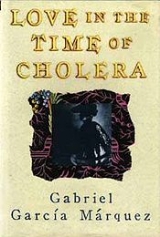
Love in the Time of Cholera
Love in the Time of Cholera (El amor en los tiempos del cólera, 1985) is a novel by Gabriel García Márquez about a fifty-year love triangle between Fermina Daza, Florentino Ariza and Doctor Juvenal Urbino set in the late 19th century and the first decades of the 20th century (roughly 1880 to 1930). The novel, a picturesque tale of unrequited love, which is written in Márquez's trademark form of magical realism, deeply explores the idea that suffering for love is a kind of nobility.
Quotes
- "There is no greater glory than to die for love." [ISBN 1-4000-3468-X] (82)
- "He liked to say that this love was the result of a clinical error." [ISBN 1-4000-3468-X] (105)
- "Save that powder for when the liberals come" [ISBN 1-4000-3468-X] (115)
- He repeated until his dying day that there was no one with more common sense, no stonecutter more obstinate, no manager more lucid or dangerous, than a poet.
- No, not rich. I am a poor man with money, which is not the same thing.
- She discovered with great delight that one does not love one's children just because they are one's children but because of the friendship formed while raising them.
- He allowed himself to be swayed by his conviction that human beings are not born once and for all on the day their mothers give birth to them, but that life obliges them over and over again to give birth to themselves.
- To him she seemed so beautiful, so seductive, so different from ordinary people, that he could not understand why no one was as disturbed as he by the clicking of her heels on the paving stones, why no one else's heart was wild with the breeze stirred by the sighs of her veils, why everyone did not go mad with the movements of her braid, the flight of her hands, the gold of her laughter. He had not missed a single one of her gestures, not one of the indications of her character, but he did not dare approach her for fear of destroying the spell.
- Together they had overcome the daily incomprehension, the instantaneous hatred, the reciprocal nastiness, and fabulous flashes of glory in the conjugal conspiracy. It was time when they both loved each other best, without hurry or excess, when both were most conscious of and grateful for their incredible victories over adversity. Life would still present them with other moral trials, of course, but that no longer mattered: they were on the other shore.
- A man knows when he is growing old because he begins to look like his father.
- ...but the project met the same fate as the previous one after Ausencia Santander sent him tumbling with her old dog's wisdom, stood him on his head, tossed him up and threw him down, made him as good as new, shattered all his virtuous theories, and taught him the only thing he had to learn about love: that nobody teaches life anything.
